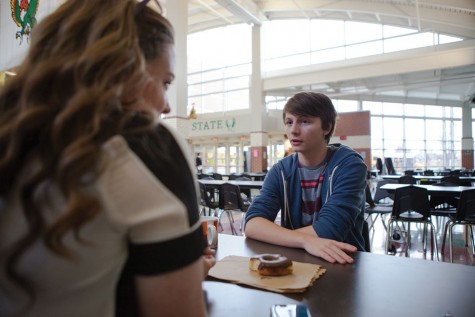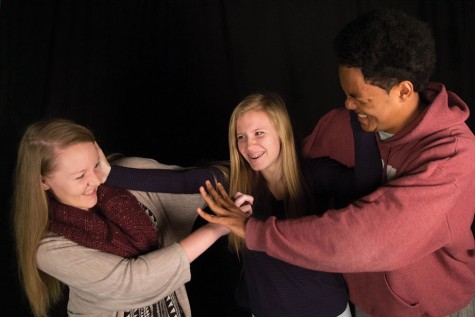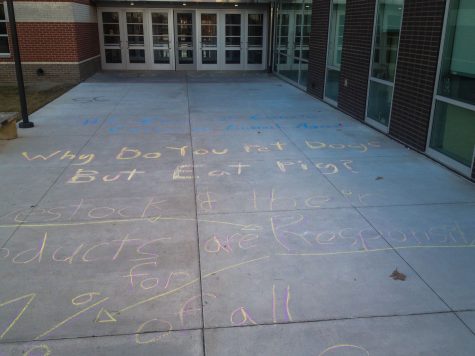Stuck in the middle: students discuss being at a midpoint
As the first semester draws to a close, students and teachers can feel stuck in the middle. While many feel stuck in Kansas, some appreciate its simplicity. Others are somewhere between a friendship and a relationship. For siblings being stuck in the middle can mean defying expectations. Those in the middle of the political spectrum discuss how moderation affects their lives. Firebirds acknowledge the stress of mid-year and provide finals tips. All in all, being in the middle encompasses different experiences.
Life in Kansas affects students in different ways
The Sunflower State, Midway USA, the belly button of the United States: Kansas. Kansas is a state with many nicknames, but few tourists can sometimes leave its inhabitants feeling literally stuck in the middle.
For sophomore Averie Beaty, however, this isn’t necessarily the case. Since moving to Kansas three different times in her life, her favorite things about the state are typically overlooked by lifelong Kansans.
“In Texas, we never really got spring or fall, so to me the Kansas weather is beautiful,” Beaty said.
After moving in and out of Kansas multiple times, Beaty eventually knew what to expect when her dad’s coaching career brought her family back to the Sunflower State.
The first time [we moved] I was 10 and kept telling people I was moving to Canada,” Beaty said. “I was sad to leave Texas because that was all I had ever known, but I was excited for a new adventure and moving to a different state instead of just a different town. The third time, I was sad to leave but I was excited that if I was, it was back [to Lawrence] because I had loved it here before.”
While Kansas has given Beaty adventure, for senior Carolyn Weiler it has been her peaceful home after adventure.
Getting out of Kansas, and even out of the country, is some students’ dream after high school. For Weiler, that dream became a reality in 2014 when she earned the opportunity to travel to India through the Kennedy Lugar Youth Exchange and Study Program. She returned to Kansas with a new outlook on her home state.
“Before I went to India, I was so ready to leave Kansas,” Weiler said. “I thought nothing could possibly be more boring or lame than staying in Kansas any longer … But going away really taught me to appreciate my roots. Kansas is a really safe and very comfortable place to grow up and being able to experience much harsher environments really sheds light on that.”
Like Beaty, Weiler’s most appreciated aspects of Kansas seem to be overlooked by most.
“I like Kansas because of the beauty in its simplicity,” Weiler said. “There aren’t a lot of big cities, and it’s open and untouched in a lot of places, which is becoming exceedingly rare.”
Being a Kansan her whole life, Weiler’s perception of life in Kansas is far different than sophomore Alejandro Carballido Flores’.
Born in Mexico, Carballido Flores moved to the United States in 2013. He first lived in Washington as a foreign exchange student, but begrudgingly moved to Kansas due to his dad’s work the next year.
“At first I was mad,” he said. “I didn’t even know where Kansas was, so I wasn’t happy about leaving everything and everyone I knew [in Mexico].” With very different cultures, life in Kansas was far different than the life Carballido Flores knew and preferred in Mexico. “People in Kansas are completely different from the people I knew in Mexico,” he said. “They act, talk, dress, and think very differ- ently.”
Eventually, Carballido Flores plans to return to his home country, Mexico.
Kansas has different meanings for different people. For some, it is a comfortable abode, and others just their place of residency until they can leave. No matter what your perception of Kansas, however, we are all together, stuck in the middle.

Dating has changed a lot since the Gen X generation. “People don’t really go on dates anymore,” senior Ethan Kallenberger said.
Students discuss the new theme in today’s relationships
A tricky middle space between friendship and relationship that has become so common is alluring to some due to its lack of definition. The days of “going steady” are long gone. Now, young couples are “cuffed” and “baes.” Though “taken” is often written in Instagram biographies, there are differing opinions about the true meaning of the word in this generation.
It seems Generation Z has developed a severe identity crisis when it comes to relationships. The need for assurance paired with this generation’s prevalent fear of rejection has created the “talking phase.” A constant in today’s young adult relationships, the “talking phase” leaves individuals stuck between a cordial friendship and romantic relationship.
The talking phase is “the period in a relationship which lasts for an indeterminable amount of time in which the primary constituent of relations between the two parties consists of talking” according to Urban Dictionary. For senior Genevieve Prescher, this is one of the most important parts of a relationship.
“[The talking phase] is great, it’s perfect for people to get know each other,” Prescher said. “The quality of conversation during the talking phase is above average because people are trying to impress each other, and people are responding quickly.”
Consisting primarily through electronic messaging such as iMessage, Twitter Direct Messages and even Facebook or Google Chat, individuals are presented with the opportunity for constant communication, a plus in sophomore Ryan Wyle’s book.
“[The talking phase] is very important for a relationship,” Wyle said. “You should get
to know the person and learn their interests. People rush into things too fast and it ends badly for the both of them, because they don’t know the other person.”
This prolonged period of conversation isn’t always for the best, however.
“Over text, you can almost sensor or screen what you say, so you are changing your interaction to make what you think the other person would be ideal, rather than necessarily being genuine,” senior Ethan Kallenberger said.
Since the talking phase includes constant communication, it nearly eliminates the need for dates. For Kallenberger, that isn’t necessarily a good thing.
“People are getting to know each other a lot faster than they would otherwise, when you’re in constant communication you’re always learning something new, whereas, each date would bring something new,” Kallenberger said.
Speeding up the process of getting to know one another creates an important effect on the foundations of relationships, especially when it doesn’t constantly include face to face contact.
“It’s bad the majority of relationships’ interactions happen over text, because that’s different than actually interacting in person,” Kallenberger said.
Evolving forms of communication have given teens the idea they need to be con- stantly in touch with their significant other, even more so when the relationship has not be defined. This societal norm of dependence essentially birthed the “talking phase.”
Young couples can now determine when they are ready to commit to being one another’s significant others. Young people are given the privacy and tools to determine the paths of their relationships. Whether a fan of the talking phase or not, it appears it’s here to stay. No longer are the days of going steady and hitting the sock hop. Now young people searching for love “slide into the DMs” or create a snap streak on Snapchat.
“The talking phase is just a product of our generation, just like dates were a product of our parent’s generation,” Kallenberger said.

Senior Carlyn Hartsock, sophomore Maleena Hatfield and senior Jalen Galloway understand the pain of being middle children.
Middle children discuss birth order stereotypes
What do Nelson Mandela, Britney Spears and Bill Gates have in common? They are innovative, extremely famous and were all born middle children.
According to Katrin Schumann, co-author of The Secret Power of Middle Children, the common stereotype of middle children is that they are forgotten or pushed into the background. Birth order stereotypes also say the oldest child holds loads of responsibility, while the youngest gets anything they want. This leaves the middle child to fade into the back and receive the least attention from their parents. Common misconceptions include that this lack of attention causes middle children to be awkward, antisocial adults.
As the second oldest of seven siblings, English teacher Kylee Wright has plenty of experience with birth order personalities. While she believes that some people fit the stereotypes, nothing is clear cut.
“Birth order personalities are based on environment,” Wright said. “If you have siblings who leave the picture through divorce or death or siblings that enter the picture through marriage or adoption, then that changes the whole sociology of the family.”
When a younger step-brother joined the family, junior Macie Reeb became a middle child.
“My parents kind of put me in the background,” Reeb said. “My brother gets a lot of attention, and so does my sister because she started college.”
The stereotype of the spoiled younger child is true for her young- er brother, but the loss of attention has not hurt her relationship with her parents according to Reeb.
“[Being a middle child] hasn’t affected how my parents see me,” Reeb said. “My parents definitely love me.”
When freshman Zain Brittain’s sister was born a few years ago, he also went from being the youngest to being a middle child.
“It makes things more complicated sometimes,” Brittain said. “You have to get used to the noise.”
Historically, middle children have gone on to become great leaders. Justice-seekers Abraham Lincoln and Susan B. Anthony were middle children, as were successful innovators like Charles Darwin and Warren Buffett. Unfortunately, not all middle children have be- come upstanding citizens, Donald Trump a prime example of this.
Receiving less attention can result in becoming more independent Wright said.
“Middle children, psychologists and sociologists say, are the ones who feel left out and that can be good or bad for them,” Wright said. “[This] can mean they feel laid back and they like not being bothered or they feel a strong desire to get attention.”
The personalities of middle children are often influenced by older children and younger children, but in different ways.
Middle children can be expected to either live up to their older sibling, or strive to be more successful than them.
“It’s hard to follow in my sister’s footsteps because she’s really smart,” Reeb said. “Sometimes I feel pressured to be like her.”
This expectation, while it can be difficult to deal with, is not always a bad thing in Wright’s experience.
“All the middle children I have known have been some of my favorite people,” Wright said. “They have interesting personalities because they learn from their older siblings, but they’re not the younger child.”
Nontraditional areas on political spectrum put students ‘in the middle’
In the mind of junior Seamus Ryan, the perfect government would mirror those of Nordic countries like Sweden and Norway. Ryan, who considers himself a Democratic Socialist, envies the free healthcare and secondary education many of these countries provide for their citizens.
“It’s a lot more government-funded programs rather than, ‘if you can’t afford it, then too bad,’” Ryan said.
Though Kansas as a whole generally votes conservative and Law- rence leans liberal, there are some students who classify themselves as neither. Ryan places himself in the latter group.
Another student with independent views is senior Cadence Learned.
“I would describe my political views as reformative, as in the current system that we do use in our society doesn’t really provide people the standards of living that it should,” Learned said.
While many Lawrencians tend to be accepting of reformative views, they don’t believe the system needs to be completely changed, Learned said.
“A lot of people tend to think we just need to reform within the system we currently have,” Learned said. “I’m usually labeled as a Democrat or liberal when in fact, I don’t even believe in political parties as a whole because I think they hinder our policy from getting to its full potential. Rather than working for a common goal, we’re just having a power struggle for Congress.”
An independent is an individual who does not align with a particular political party according to AP Government and Modern World History teacher Jeff Haas.
Moderates are occasionally grouped with independents in political discussion. However, the two are very different. Haas classifies moderates as those whose political views don’t place them on one end or the other of the liberal-conservative political spectrum.
“So it’s possible for a moderate to hold a view on a singular issue that’s not moderate, but on a range of issues it would put you between conservatism and liberalism,” Haas said.
Though sophomore Ting Ting Shi has more liberal views, she calls herself an independent.
“I don’t like to align myself with any political party because at different times, there could be better people in some party than there are in others,” she said.
Like Shi, senior Lydia Palmer has more liberal views. However, she is an independent for different reasons than Shi.
“I have certain viewpoints, but I don’t really agree with how either party would solve these problems,” Palmer said.
Those with nontraditional political views still impact the political process. The two major candidates can count on votes from their parties, but Independent voters tend to vote based on candidates.
“Whoever can appeal to moderates and Independents has a tendency of winning,” Haas said.
Some students with these views have already chosen their favorite candidate for the next election. Learned and Palmer would vote for Bernie Sanders if the election were today, and Shi would vote for Hillary Clinton.
“I would say I agree more with Bernie Sanders’ views, but because he’s so far left I don’t think that he could actually make as big of a difference … as Hillary Clinton,” Shi said.
Though many students are independent for different reasons, Palmer believes extremity on the political spectrum is bad for the government.
“People are a little too extreme sometimes, on either end,” Palmer said. “There’s no reason to just be extreme, in my opinion.”
Middle of school year affects students in different ways
No matter which grade, age or intellectual state, there is one thing the majority of students hate: finals. Finals only come around twice a year, but first semester tests are the most difficult for many students.
“It’s a very busy time of the year,” social studies teacher Aimee McLendon said. “There are holidays, other activities and I think that the weather doesn’t help any. With the gray days and the cold, I think it’s just getting tired of everything that’s going on that makes [the middle of the school year] difficult for students.”
As classes end for the semester, teachers often give more projects and assignments to help prepare students for finals and add more to the gradebook.
“At the end of the semester obviously all classes are wrapping up at the same time, so there’s extra work on top of what you would normally have,” McLendon said.
Freshmen are close to completing their first semester of high school. Having never taken a final exam before, this can be a stressful time for them. Freshman Walker Koberlein said he feels stuck in the middle of the school year and doesn’t exactly know what to expect from finals.
“It’s kind of like the hump,” Koberlein said. “You’ve worked hard already and you just want to give up, but you have to push through.” Working to keep grades up throughout the semester is the key to doing well on finals.
“It’s really hard if you get messed up at the beginning of the school year to fix that,” senior Nayoka Perkins said.
Dreary weather and holiday preparations can seem like excellent excuses for procrastination, but do little to help grades.
“Having to deal with tests and assessments as you’re trying to get ready to do holiday stuff [is difficult],” sophomore Jessica Coleman said. “[But] you have to know what you’re going over.”
When it comes down to the daunting task of actual studying, students must use resources wisely.
“Study the study guides given to you,” Perkins said. “Review all the assignments given to you through the year.”
No matter how well the first semester turns out, Perkins said, it is important to take second semester more seriously. Coleman agrees.
“Make sure that if in first semester you slacked off, try to keep up and finish the year strong,” she said.
Though finals can be stressful, McLendon emphasizes the importance of students maintaining their health and not letting the extra pressure affect their lives too much.
“[Students should] make sure that they’re taking care of them- selves,” McLendon said. “[They need to be] getting enough sleep and eating right and making sure they get some kind of activity.”
Keep work organized and know what is necessary for studying, McLendon advises.
“I think something unknown is far scarier than what you know,” she said. “If you have a list of everything that you’re going to have to do, then it’s a little bit easier to deal with.”









